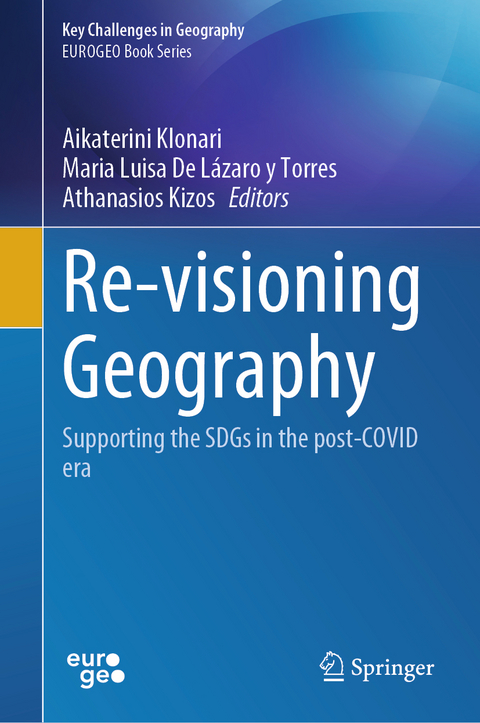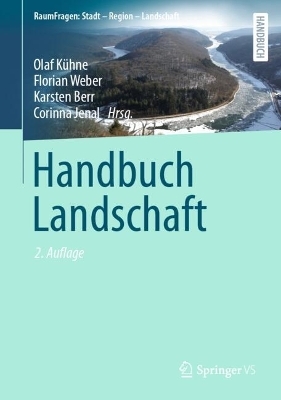
Re-visioning Geography
Springer International Publishing (Verlag)
978-3-031-40746-8 (ISBN)
Geography is a discipline with a profound interdisciplinary character focusing on studying the complex interactions between nature and society. Geography can advance the level of knowledge and awareness and provide important contributions to support the achievement of Sustainable Development Goals. This book explores some of these issues, while also disseminating and supporting the efforts of geographers worldwide to promote the implementation of the SDGs. It offers local and global perspectives to a variety of topics covered by the SDGs, such as:
- How do different actors such as universities, companies and education actors respond to Sustainable Development Goals, especially during the complex context of the COVID pandemic?
- What is the role of novel spatial technologies and open/big data in achieving SDGs and how can Geography assist?
- How are new eco-social challenges positioned in a post-pandemic global change?
- What are novel educational contexts and resources that can be used to transform society toward sustainability of socioecological systems?
- What conceptual frameworks and strategies can contribute to the construction of societies based on human welfare and the care of nature?
This book is focused on innovative sustainability-oriented geographical research on the above (and more) topics that explore the diverse social, environmental, economic and cultural contexts at various spatial scales. It also includes chapters that report on geographical education initiatives in schools and universities, the implication of geographers in community-based learning and increasing community's awareness in terms of environment, climate change and sustainable development as well as chapters that make use of geospatial technologies (e.g., remote sensing, GIS, etc.) both in geographical research and education forsustainable development are particularly relevant for the book.
Part 1 Geospatial technologies.- The effect of an open educational resource (OER) on student teachers' abilities to diagnose students' written argumentation skills.- Development of the Online Geospatial Problem-Solving Instrument: Investigating Elementary Students' perceptual processes in geospatial problem-solving..- A Spatial Knowledge Infrastructure for the Aegean Archipelago.- A Virtual Window to the World: Using Story Maps for SDG Visibility and Environmental Educatio.- Education for sustainable water consumption in multinational collaboration teachers training: Goals and Challenges.- Connecting Literature and Web Maps: Hungarian writers and poets online.- Part 2: Education, Geography and new Geospatial technologies and tools.- Teaching Geography with a Web GIS Approach.- Education for Sustainability Using Cloud-based Geographic Information Systems at University.- Comparative Dimensions of teaching Geography & History in Austria and in Israel, Migration of Vienna Jewry during the 1930s.- Geographiic Education for the Promotion of Spatial Citizenship: Collaborrative Mapping for Learning About the Local Environment in a Global Context.- Part 3: COVID-19 and post-COVID -19.- The Art of Geographical Analysis of Covid-19 Related Data.- Development of a Synthetic Index of Social Vulnerability to Covid-19 in the City of Zaragoza (Spain).- Students' Satisfaction with Synchronous Online Learning in Times of COVID-19: A Case Study of Greek Geography Students.- Can Climate Crisis Go Viral? A Review of Climate Change Communication Lessons in the Aftermath of the COVID-19 Pandemic.- Towards a EU's Sustainable and Humane Border Regime.- Part 4: Gepspatial technologies and application in agriculture.- Pest Management with Precision Farming Tools: the Case of the Olive Fly (Bactrocera Oleae).- Sustainable Networking Solutions in Remote IoT Environments: Use Cases, Challenges and Solutions for Smart Agriculture.
| Erscheinungsdatum | 05.10.2023 |
|---|---|
| Reihe/Serie | Key Challenges in Geography |
| Zusatzinfo | VII, 325 p. 93 illus., 86 illus. in color. |
| Verlagsort | Cham |
| Sprache | englisch |
| Maße | 155 x 235 mm |
| Gewicht | 624 g |
| Themenwelt | Naturwissenschaften ► Geowissenschaften ► Geografie / Kartografie |
| Schlagworte | climate change • geographical education • Geographic Information • Geographic Visualisation • Human geography • Interdisciplinary • physical geography • spatial planning • Sustainable Development Goals |
| ISBN-10 | 3-031-40746-6 / 3031407466 |
| ISBN-13 | 978-3-031-40746-8 / 9783031407468 |
| Zustand | Neuware |
| Haben Sie eine Frage zum Produkt? |
aus dem Bereich


